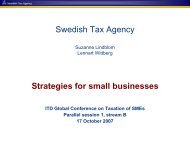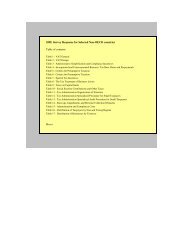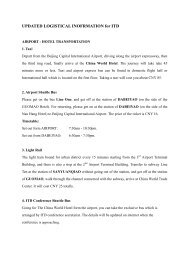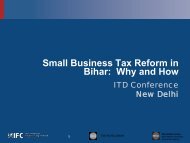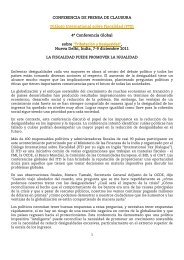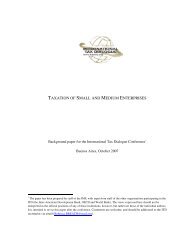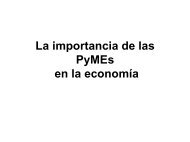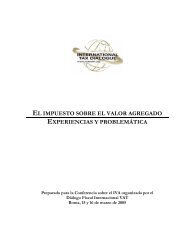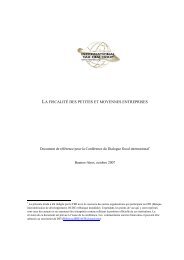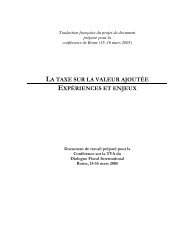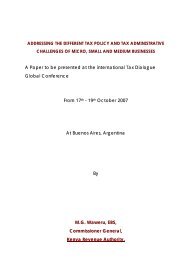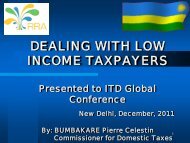Arcotia Hatsidimitris - International Tax Dialogue
Arcotia Hatsidimitris - International Tax Dialogue
Arcotia Hatsidimitris - International Tax Dialogue
Create successful ePaper yourself
Turn your PDF publications into a flip-book with our unique Google optimized e-Paper software.
3. GETTING OFF TO A GOOD START – 33<br />
facts. It is becoming increasingly normal practice in tax administrations to use face to face dialogue as<br />
a means of agreeing the scope of and next steps in a transfer pricing audit or enquiry.<br />
Many tax administrations are moving towards real time working of large business enquiries and<br />
audits as a means of working more productively and achieving earlier certainty for tax administrators<br />
and business alike. In relation to transfer pricing this means business having early discussions with tax<br />
administrations about any restructuring and the potential impact on its transfer pricing policies. This<br />
makes it easier to identify cases that would benefit from a joint audit approach with another tax<br />
administration or an Advance Pricing Agreement.<br />
Requests for business records relevant to transfer pricing audits or enquiries<br />
The use of specialists is addressed in Chapter 7 but it is worth mentioning here the value that they<br />
are able to add at this early stage. Where sectoral or industry specialists exist in the tax administration,<br />
their involvement in these meetings can be very helpful.<br />
Sectoral specialists can also help to frame requests for relevant business records. They are often<br />
able to advise, from personal experience, precisely what forms of relevant documentation are likely to<br />
have been produced and so help to ensure that any material requested will both exist and be of value to<br />
the enquiry. The Canada Revenue Agency already involves its sectoral specialists in the process of<br />
constructing information requests at the outset of enquiries. Industry experts also help focus HMRC’s<br />
interventions and provide invaluable assistance in framing information requests and scoping out many<br />
areas of dispute.<br />
Box 3. Example of UK’s use of sector experts<br />
In several transfer pricing cases involving the pharmaceutical industry HMRC used relevant experts<br />
to identify the nature and type of records which the businesses were likely to keep or were required to keep<br />
under industry regulations. This enabled information requests to be far more specifically targeted and<br />
importantly set out using industry ‘jargon’ where necessary. This approach was beneficial to both the taxpayer<br />
and the tax administration. It resulted in far smaller volumes of business records being requested and provided<br />
thus easing both the compliance burden on the taxpayer in terms of locating and providing it and the resource<br />
burden on the tax administration in reviewing it. Equally, it provided for less misunderstanding as to precisely<br />
what was being sought and consequently fewer but highly directed supplementary requests. Consequently, the<br />
time taken to resolve enquiries was significantly reduced.<br />
Whatever the approach to obtaining business records - whether the tax administration makes use<br />
of early dialogue with the taxpayer to inform its information request, or prefers to make an immediate<br />
request for business records – all tax administrations emphasised the importance of obtaining the<br />
transfer pricing documentation held by the business as part of the fact finding process. This is why<br />
many countries specify what contemporaneous documentation needs to be maintained by MNEs and<br />
made available on request.<br />
Generally tax administrations aim to provide guidance to MNEs on the transfer pricing<br />
documentation they should maintain. However, the extent to which specific requirements are spelt out<br />
in tax legislation is more varied. The spectrum ranges from those that have a very prescriptive<br />
approach to those where nothing is prescribed in legislation. Canada, for example, has specific<br />
provisions governing the maintenance and provision of documentation to support the transfer prices<br />
adopted by a business and this is backed up by a penalty regime 1 . In contrast the UK does not have<br />
specific statutory rules governing transfer pricing documentation but does provide guidance about the<br />
maintenance of transfer pricing records and how to ensure that they comply with general obligations to<br />
make accurate returns of income 2 . HMRC’s guidance provides advice on what (1) primary accounting<br />
DEALING EFFECTIVELY WITH THE CHALLENGES OF TRANSFER PRICING © OECD 2012



